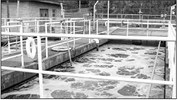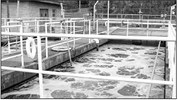Marathon seeks plant delay


Utility commission members want in-person public hearing
The Marathon City Utility Commission voted Thursday to ask the Department of Natural Resources for a one-year extension to construct a new sewage treatment plant. The delay, commission members said, will allow the village to hold an in-person public hearing on the $7.7 million proposal without the threat of COVID-19.
At the meeting, engineers Tina Sebold and Vern Witthuhn, Strand Associates, Madison, reviewed the proposed Aero-Mod treatment plant plan, its costs and timeline for construction.
Committee members except for Ryan Dallman, who objects to contracting with MilTrim Farms, Athens, for phosphorus credits, said they supported the new sewage treatment plant plan.
The members, along with village board members who attended the virtual meeting, said, however, they were uncomfortable voting for a new plant that would raise sewer rates by 66 percent without hearing directly from the Marathon City public. Committee members said that the elderly on fixed incomes would likely be the individuals who would testify at a hearing, but they said they would not subject these senior citizens to COVID-19 exposure nor force these people to use computerized devices they are unfamiliar with to give testimony.
“Virtual is fine and dandy, but a lot of people can’t do that,” said commission member Ted Knoeck. “To me, we should petition to get an extension from the DNR. Otherwise, we will end up in the same boat as the election. It will cause issues. We need to extend this for an in-person public hearing.” Village administrator Andy Kurtz said it made no sense to ask for anything less than a oneyear extension. He said doing otherwise would make it difficult to request DNR funding and properly put out bids at the right time of the year.
Under a schedule proposed by Strand Associates, the village would go to public hearing this month, quickly approve the plan, have blueprints drawn up by September and award construction bids by January 2021. Construction would be completed by September 2022.
Kurtz said he was “cautiously optimistic” the DNR would grant the village’s request.
Village board members indicated they might not take no for an answer. Trustee Keith Paul said the village needed to contact its representatives in the legislature if the DNR would force the village to move ahead quickly. Trustee Mark Ahrens said he would be willing to pay DNR fines, if necessary, so that the village residents would have an opportunity to express their opinion on the new sewage treatment plant. “For the elderly and other people to have an impact on this is huge,” he said.
Kurtz said the village could hire legal counsel to proceed with the plant project on its own timeline.
In their presentation, Sebold and Witthuhn said the village’s current sewage treatment plant had served residents well, but that the plant, first constructed in 1971 and substantially remodeled in 1999, was worn out and had failing equipment.
They said the plant had failed four times where, during periods of peak flow, water in the process of being treated spilled over the plant’s walls.
They said remodeling the plant made little sense given a cost that exceeded $9 million. The plant site presents its own challenges, they said. The current plant parcel is small and it sits on bedrock.
The project plan, the engineers said, requires demolition of much of the old plant. The plan calls for piping treated effluent to a swale that is next to the Big Rib River, replacing a damaged pipe that sends effluent into the river.
The engineers said they looked at building the plant in phases but rejected that plan as too expensive.
The pair said building the plant would raise typical residential quarterly utility rates from $34.81 (3,070 gallons of water per month) to $53.26 (given that budgeted contingencies are not used). They said that this increase would make Marathon City’s sewer bills higher than Wausau metro communities, but about “middle of the road” to other similarly sized rural communities around the state.
The engineers said the village’s current DNR permit requires the village to reduce its phosphorus discharge to the Big Rib River. Currently, the village sends 792 pounds of the chemical annually into the river. As a result of a Total Maximum Daily Load report, the village needs to lower that discharge by 67 percent to 260 pounds. The engineers said the village would be best served paying MilTrim Farms $26,125 a year for phosphorus credits on the farm’s 4,719 acres. This works out to $55 a pound for the credits. This way, the pair said, the village only has to reduce its phosphorus discharge by 27 percent to 578 pounds per year. The village can do that, the pair said, by more aggressive chemical treatment of the plant effluent.
Village administrator Kurtz said a contract with MilTrim Farms would not necessarily guarantee the village would buy that amount of credits each year. The village, too, he said, may opt to buying credits off a state phosphorus clearinghouse that has as yet to be created.

